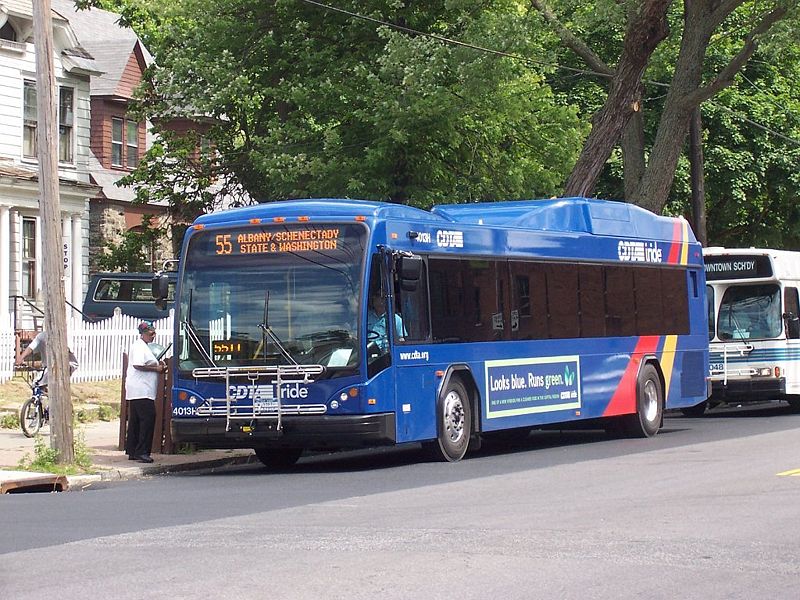Washington — Following years of effort by New York congressional leaders, the U.S. Department of Transportation last month announced it would award the Capital District Transportation Authority $26.9 million for the River Corridor Bus Rapid Transit project, known as the Blue Line. The plan includes the construction of a 16-mile bus route along the Hudson River, linking Waterford to downtown Albany.
The new line is intended to increase reliable access to key activity hubs and connect six communities.
“We are excited and encouraged about receiving the grant money to make our River Corridor BRT line a reality,” said CDTA spokeswoman Jaime Watson. “Receiving this money comes after many years of hard work by our staff [being] diligent and following the process.”
CDTA awaits the official signing of the Capital Investment Grant agreement, which would cover 65 percent of the project’s $41.4 million cost. Once that happens, money should flow to CDTA to reimburse it for project expenses.
But under the Trump administration, cities across the country strapped for infrastructure money have often been left in limbo because the Transportation Department has consistently delayed authorizing federal funding for new light rail systems, bus rapid transit, commuter rail and subways.
“USDOT has deliberately slowed the Capital Investment Grants pipeline, jeopardizing numerous meritorious transit projects around the country,” House Appropriations Committee Chairman David Price, D-N.C., told the Times Union.
The Trump administration has proposed cutting or eliminating federal funding for transit infrastructure grants in budget proposals, saying the money should come from state or local governments. Instead, Congress appropriated about $6 billion over the past three fiscal years for Capital Investment Grants (CIG), a program that subsidizes local governments’ transit projects.
The Federal Transit Administration has yet to actually sign grant agreements to award about half of the appropriated money, according to data provided by the Department of Transportation, placing doubt on when CDTA can expect its signed agreement.
A 2018 Government Accountability Office report concluded the FTA “runs the risk of violating federal law” for its failure to properly administer the CIG program as mandated by the Fixing America’s Surface Transportation Act.
“Funding for new CIG projects will be awarded once the project sponsors complete the rigorous CIG program steps outlined in law and FTA signs construction grant agreements with the project sponsors,” said an FTA spokeswoman.
Despite these promises, some sponsors and congressional leaders expressed concern for the pattern of delays and significant administrative hurdles. Some recipients who applied for CIG funding across the country called it an “arduous” and “drawn-out process” that takes multiple years.
“It makes absolutely no sense that this administration has been so reluctant to push forward on infrastructure projects,” said Rep. Bonnie Watson Coleman, D-N.J., who sits on the House appropriations subcommittee on transportation.
The Trump administration’s track record on supporting transit projects clouds the plan for a $2 trillion infrastructure deal announced after House Speaker Nancy Pelosi and Senate Minority Leader Chuck Schumer met with President Donald Trump on April 30, Watson Coleman said.
“There’s no plan to pay for [an infrastructure deal] and there’s no understanding of exactly what it would include,” she said. “I don’t think the president will remember what he allegedly promised.”
Although Sen. Kirsten Gillibrand, D-N.Y., was not aware of any specific funding issues with the Albany Blue Line project, she expressed concern over the administration’s failure to recognize public transit as an important priority.
“This has been demonstrated by significant budget cuts to CIG, with the Gateway Tunnel project, and other projects in New York and across the country,” said a spokeswoman for Sen. Gillibrand.
Transportation for America, a progressive policy organization working to expand transit, said the delay in awarding appropriated money is part of the Trump administration’s agenda to weaken federal support for transit.
“The president and his team have made clear that the federal government should not fund transit and that it is a local responsibility,” said Beth Osborne, executive director of Transportation for America. “They have not minced words about their feelings for the federal role of transit.”
According to a report by Transportation for America, only $1.2 billion, or 32 percent, of appropriated CIG funding has been properly obligated to project sponsors, which are often local transit authorities.
After pressure from transit advocates over the FTA’s slow handling of funding last year, Congress mandated that FTA distribute at least 80 percent of fiscal 2018 appropriated funds no later than December.
The funding delays often force cities, states or transit operators to shoulder the costs of essential infrastructure projects, Osborne said. “You’re faced with moving forward and [taking] the risk that you may not get federal dollars and you’re on your own,” Osborne added.
The FTA reported that it has “executed” $3.3 billion for 13 CIG projects since January 2017. It anticipates signing grant agreements and awarding another $1.8 billion to nine different projects in the future, including Albany’s bus rapid transit route.
But to Osborne, what matters is having a signed full-funding grant agreement, not a statement of intended allocation from the FTA.
Eric Eidlin, a station planning manager at the San Jose Department of Transportation in California and former FTA employee, suggested the delays have resulted from the new administration not having a full grasp of the federal bureaucracy.
“It’s a huge machine with thousands of wheels turning,” Eidlin said. There also is the issue of a lack of consistent leadership within the federal agencies too, he said.
The FTA has not had a permanent administrator since Trump came into office. In March, Trump’s appointment of former Rep. Thelma Drake was approved for a second time by the Senate Banking, Housing and Urban Affairs Committee. The nomination now heads to the Senate for a final vote.


